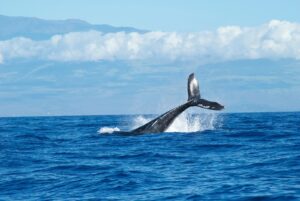Lions are classified as obligated carnivores, which means they survive primarily on meat.
However, the lions’ food habits are more complex. Lions also need vitamins and minerals that are not available if they eat only the muscle of their prey.
They also do not drink a lot of water, but they still need hydration.
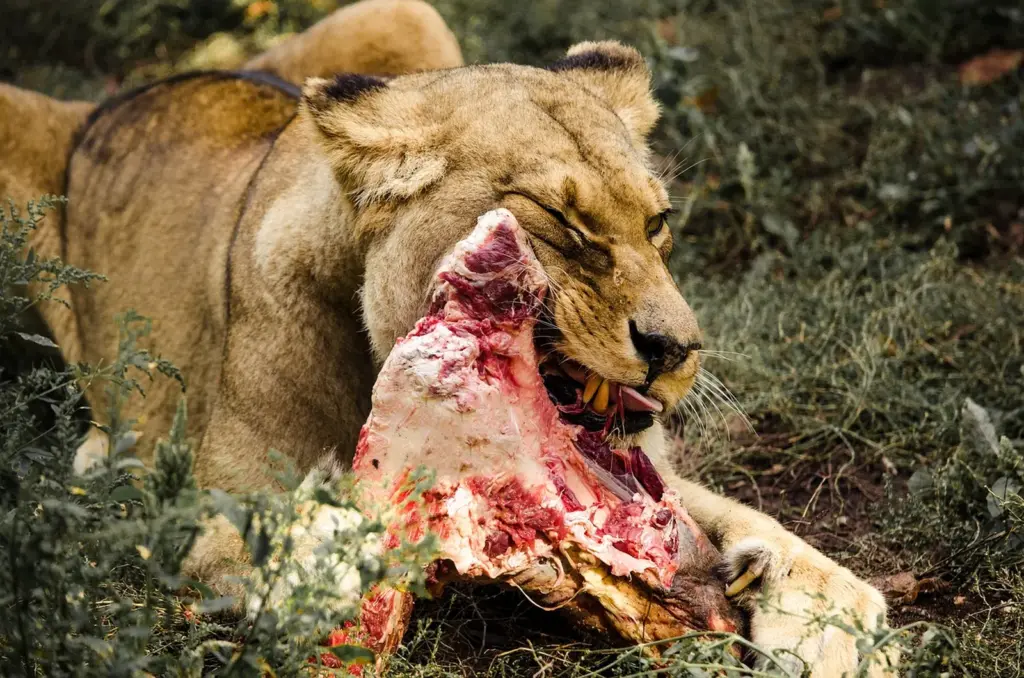
What Do Lions Eat?
They eat meat from their prey, but their preys are often herbivores with intestines full of digested grass.
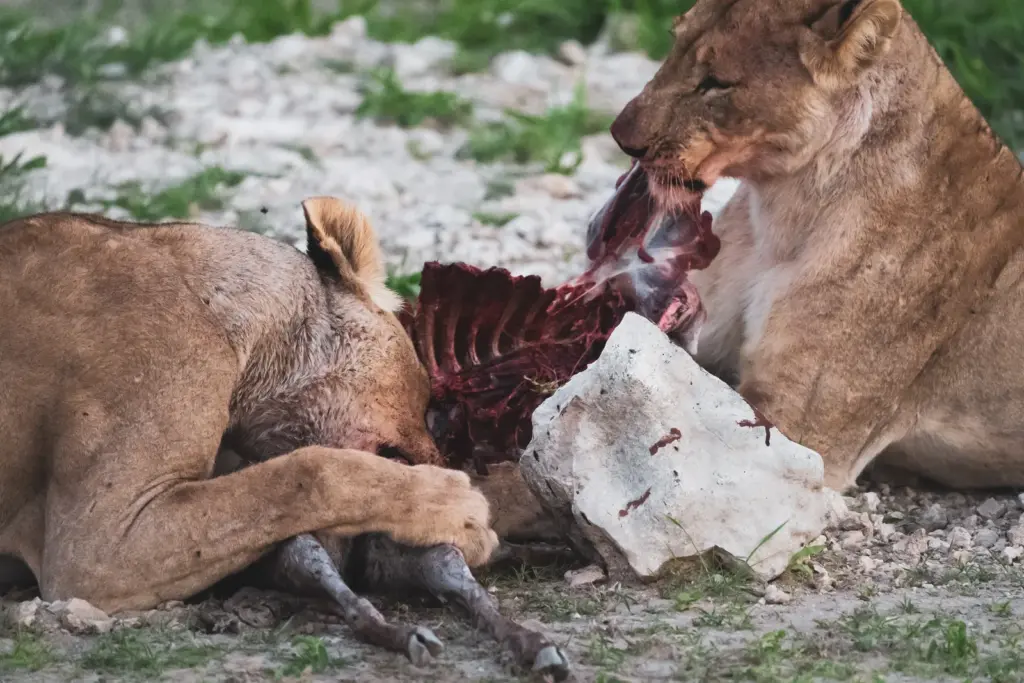
Lions can eat every part of their prey, usually starting from the interior organs, then they move to the muscle. Bones are generally chewed on for last.
The internal organs of their prey are an essential source of vitamins, and bones are crucial for ingesting critical minerals like calcium.
This feeding habit helps lions with digestion and general health.
A Lion feeding only on lean muscle will slowly feel the effect of malnutrition.
All-meat diets pose potential problems. For example, imbalanced calcium: phosphorus ratio leads to growth problems or metabolic bone disease. This ratio in the body is typically 2:1, and it must be maintained in the diet, or at least be very close to it. All-meat diets are high in phosphorous and have little calcium, creating potential health issues. Organs such as the liver, kidney, and heart tend to have the worst ratios of Ca: P and may run as high as 1:44.
The gut contents of prey provide vitamins B and K. Vitamins A, E, and D are also provided by a source different than the muscle. They are found in the fat or other tissues in internal organs.
Do Lions Eat Grass?
How can lions be healthy if they only survive on meat? Do they eat grass?
Yes, sometimes lions eat grass. However, they lack enzymes and digestive processes to break down regular grass, and often the ingestion of grass is to cause vomit to help when they have an upset stomach.
How Much Food Do Lions Eat?
Male lions eat an average of 7kgs of food daily, and lionesses 4.5kgs. They can eat up to 15% of their body weight during one meal.
They usually eat every three to four days. Sometimes lions can stay without eating for longer and then eat a large meal at once
For this reason, lions can hunt even if they are not hungry.
How do Lions Hunt for Their Food?
Lions typically live in groups formed mainly by females and cubs; only 2 or 3 male lions are generally in a pride.
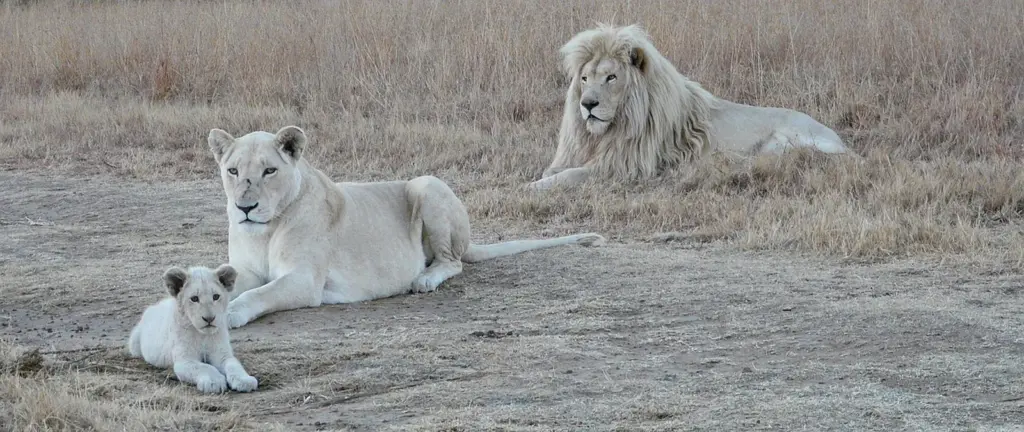
In the pride, lionesses are responsible for hunting, being more agile and fast than the males. However, once the prey is hunted, the males eat first.
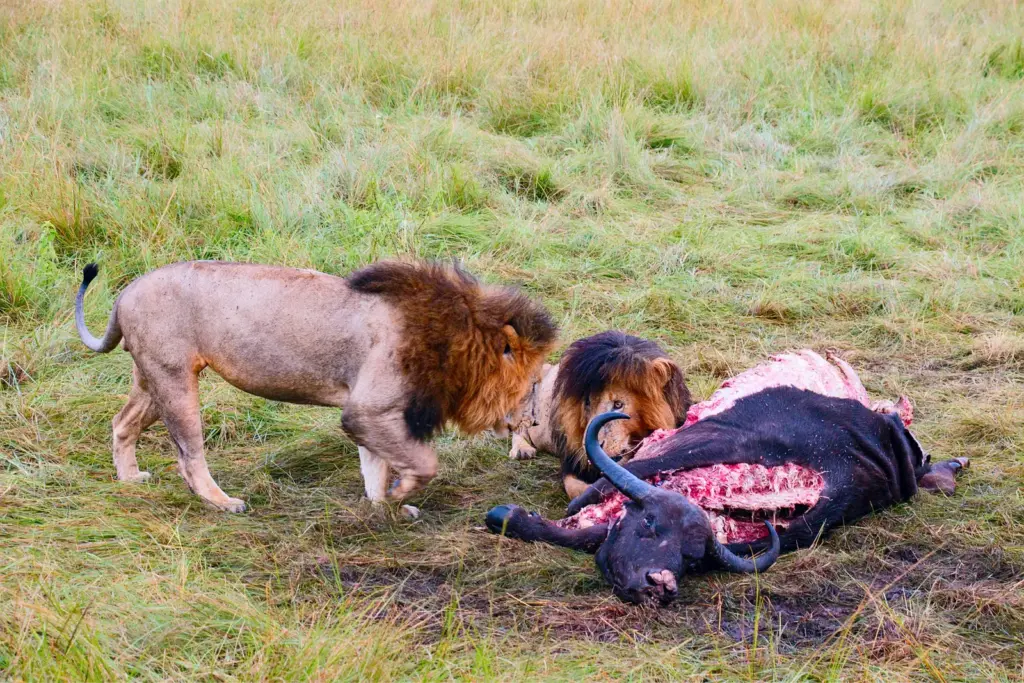
Lions are not very fast, reaching a maximum speed of 60km/hr (40 miles/hr), and do not have a lot of stamina. For those reasons, they mostly try to stalk their prey before attempting to chase them.
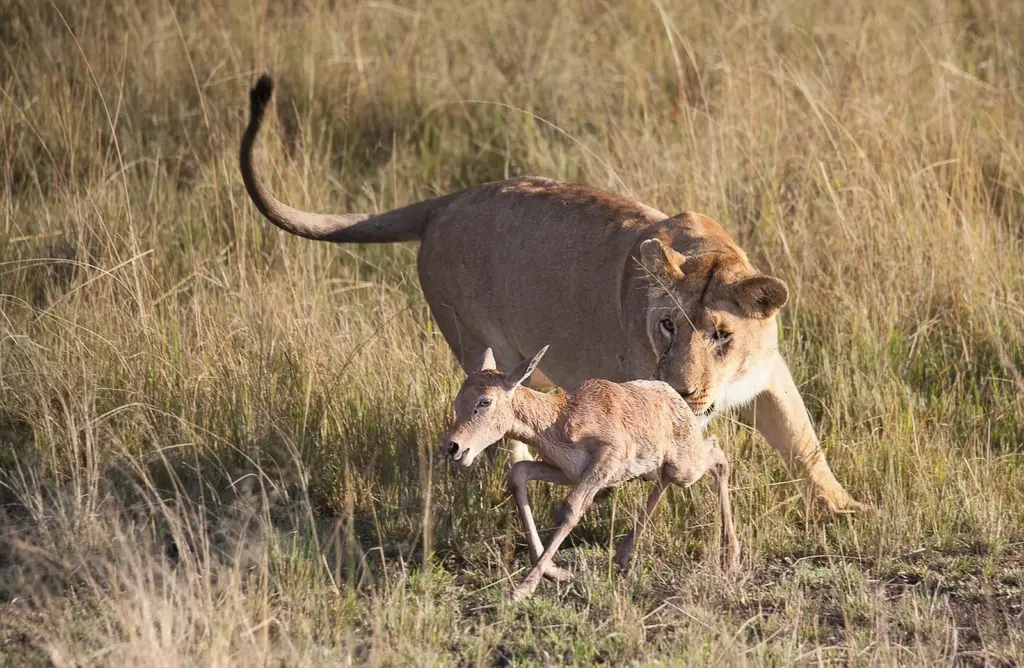
They must maximize their group effort, work together, and hunt with group tactics.
Lions are known for not being great at sharing their food, which means weaker pride members eat for last and sometimes are left without feeding.
Solitary males can not hunt in groups. They usually try to stalk their prey and tend to live in areas close to rivers or water courses where they know potential prey will come for drinking.
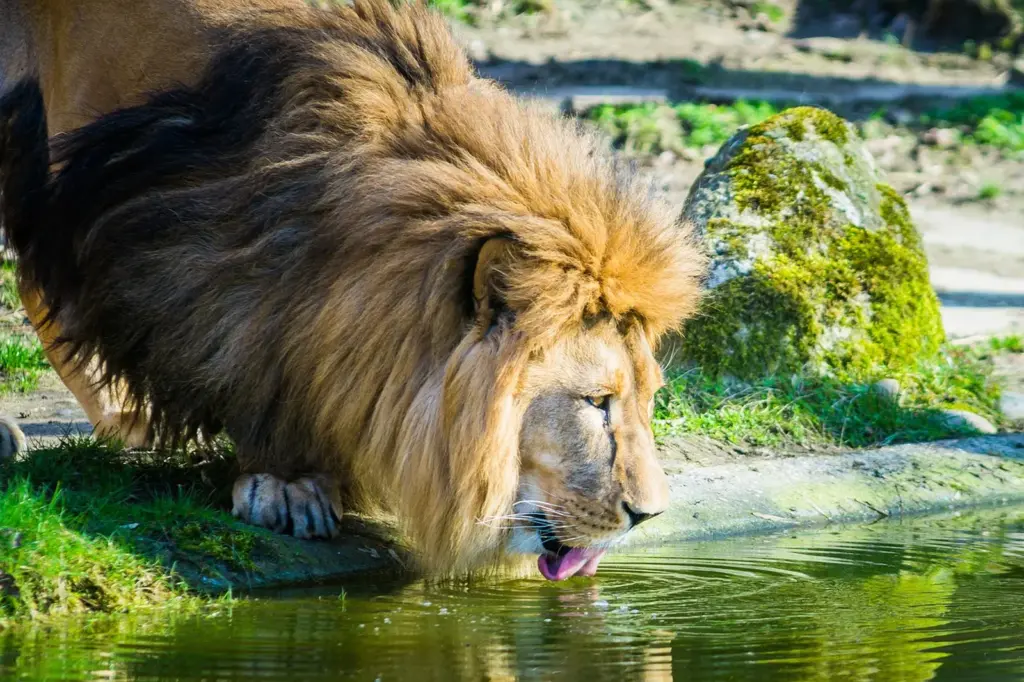
Once they have approached the prey and are close enough, they tend to bite the ankle if the prey is relatively small or jump on their back if the animal is bigger.
What Animals Do Lions Eat?
Lions can try to prey on any sort of animal. But their favorite preys are:
1. Wildebeest
2. Zebras
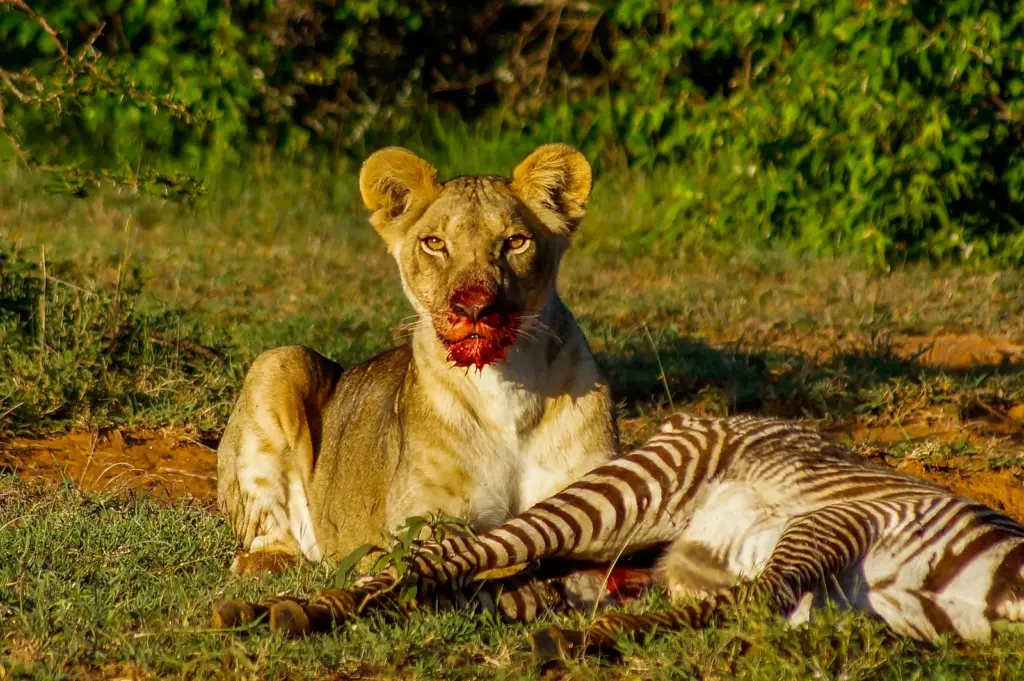
3. Impalas
4. Gazelles
5. Antelopes
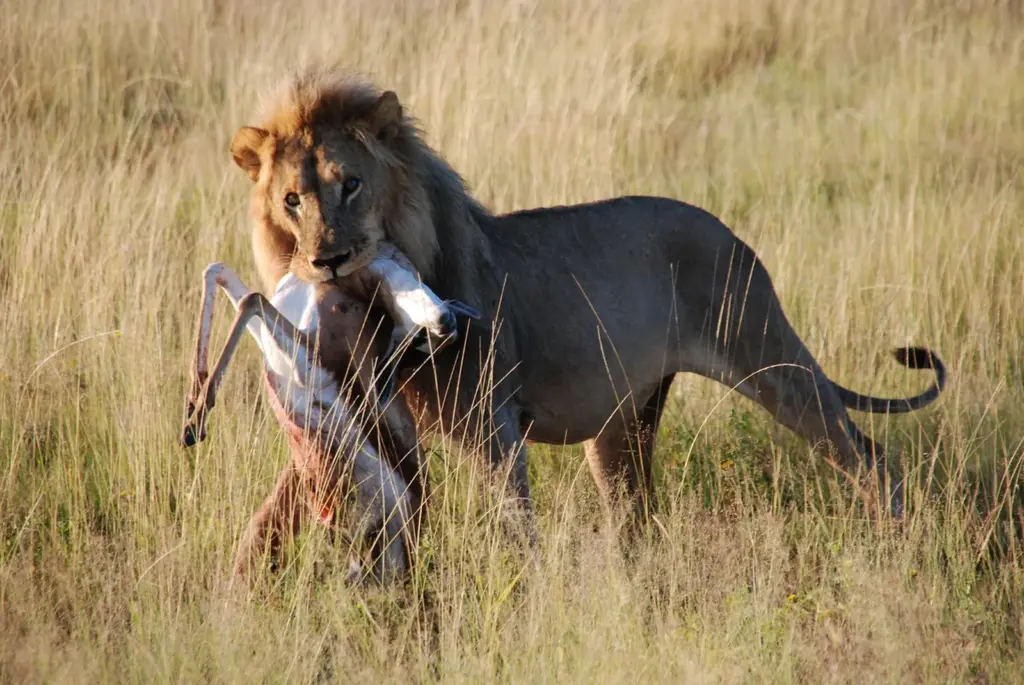
6. Warthogs
7. Gnu
8. Young elephants
9. Small Giraffes
10. Springboks
11 Hares
12. Birds (occasionally)
13. Porcupines (though they are a risky meal due to their quills)
14. Kudus
15. Hippos (rarely and typically young ones)
16. Rodents (occasionally)
Lions are apex predators and can prey on a wide variety of animals; however, the availability of these animals varies depending on the lion’s habitat and the specific region. Depending on the circumstances and opportunities, other animals may also be part of the lions’ food diet.
What Animals do Lions not Eat?
There are certain animals that lions typically do not prey on due to the difficulty, risk, or rarity of such encounters. Some of these animals include:
- Adult Elephants: While young elephants are vulnerable, adult elephants can be lethal for lions, making them challenging prey. Lions sometimes may try to attack and kill aging, sick elephants if they find the opportunity.
- Adult Rhinos: Attacking an adult rhino poses a significant risk for lions due to their size and aggressiveness.
- Adult Hippos: Though lions might occasionally take young hippos, fully-grown hippos are dangerous and will fiercely protect their young.
- Crocodiles: Confrontations between lions and crocodiles are not unusual, especially near water sources; however, it is rare for lions to prey on adult crocodiles.
- Large Predatory Birds: Lions don’t typically hunt birds like eagles or vultures.
- Hyenas: While there is great animosity between lions and hyenas, lions do not eat hyenas. They might kill them during confrontations but will often leave the carcass untouched.
- Aardvarks: These nocturnal animals are rarely encountered by lions.
- Mature Giraffes: Due to their height and strong legs, giraffes are not lions’ favorite prey due to the risk of lethal kicks. However, lions do sometimes hunt younger or weaker giraffes.
- Small Amphibians and Reptiles: Animals like frogs, lizards, and small snakes are not typically part of a lion’s diet.
It’s important to note that while lions may not typically eat these animals, the dynamics can change based on environmental factors, the availability of other prey, and specific circumstances.
Sometimes lions can also be scavengers and feed on left carcasses. This situation is especially true in periods of extended absence of suitable prey and for solitary males struggling to chase and prey independently.
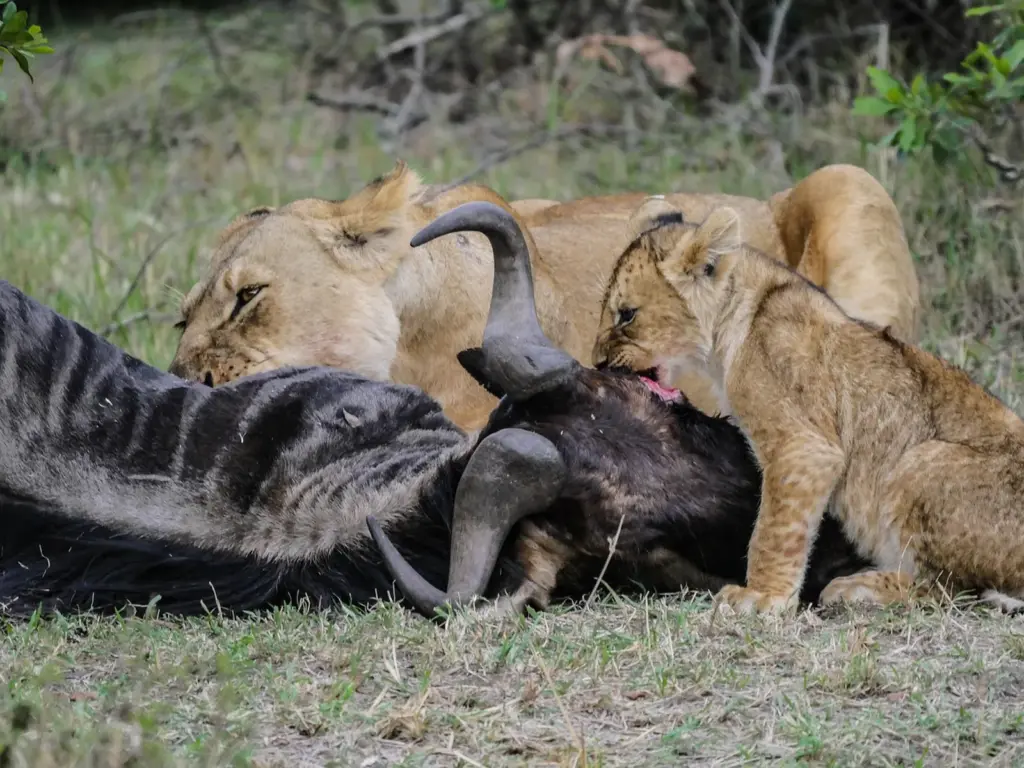
Do Lions have Predators?
As apex predators, lions are at the top of the food chain and typically do not have natural predators that hunt them for food. However, they face threats from other animals, primarily for food territory, dominance, or survival.
- Hyenas: While they don’t hunt lions for food, spotted hyenas are known to confront lions, often over carcasses. These confrontations can occasionally lead to fatalities on either side.
- Leopards: They don’t typically attack adult lions, but leopards can be dangerous for lion cubs if left without protection from the pride.
- Cheetahs: Like leopards, cheetahs don’t attack adult lions but could be dangerous to unattended cubs.
- Crocodiles: Crocodiles can be aggressive towards lions in areas where their habitats overlap, particularly near water sources. Especially true if lions are trying to cross water or are attempting to hunt near water edges.
- Other Lions: One of the most significant threats to lions, especially cubs, is other lions. When a new male or group of males takes over a pride, they often kill young cubs to bring the lionesses back into estrus sooner and allow the dominant male’s genes to be passed on.
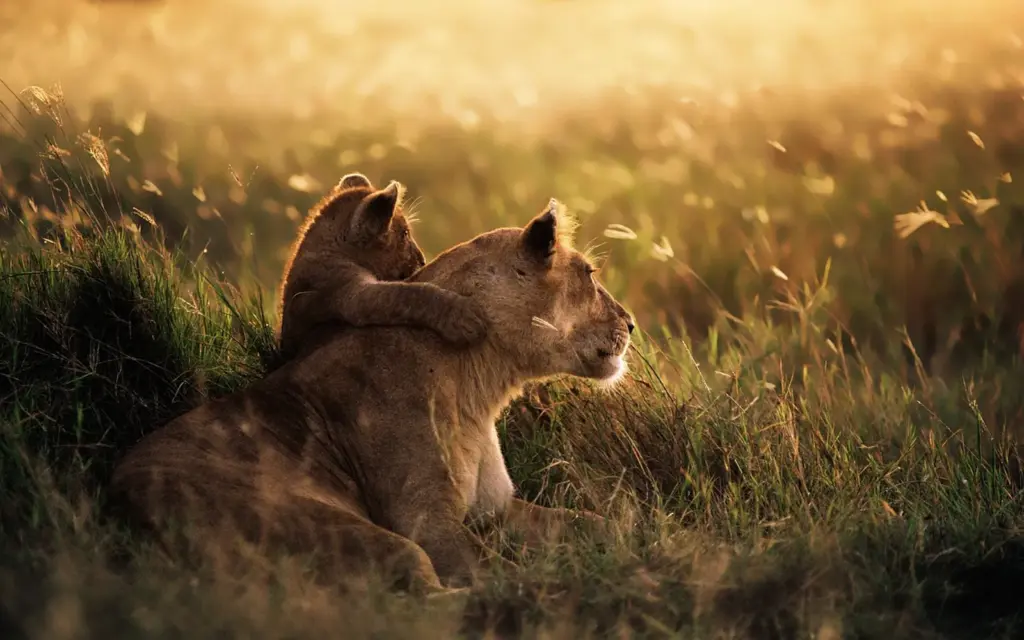
Lions Food: Conclusions
As obligate carnivores, lions primarily rely on meat for sustenance. Still, they also need essential vitamins and minerals that they include in their diet feeding on their prey’s internal organs and bones. It’s fascinating that while they may consume grass, it’s mainly for digestive aid, not nutrition.
Lions’ feeding habits underscore the complex balance of nature. The variety of prey they consume, combined with the necessary vitamins and minerals they seek, exemplifies the interdependence of the animal kingdom. Their food consumption behaviors offer a unique lens into their survival tactics and ecosystem role.
Environmental factors, prey availability, and specific situations that might cause lions to deviate from their standard prey are crucial for their survival and conservation.
Understanding these nuances enhances our knowledge of animals and underscores the importance of preserving their natural habitats. As humans expand upon wildlife spaces, it becomes increasingly pivotal to understand and respect the delicate balance of nature.
What are your thoughts on the intricate dietary habits of lions? Did anything particularly surprise you? We invite you to share your reflections in the comments section below.
Remember to share this article on your social media channels if you find it informative. Let’s spread the knowledge and foster a greater appreciation for the intricate web of life in our world’s ecosystems.



